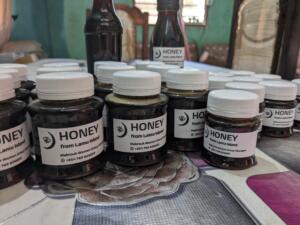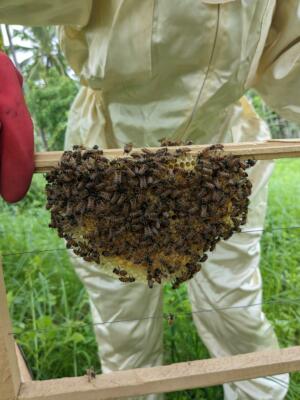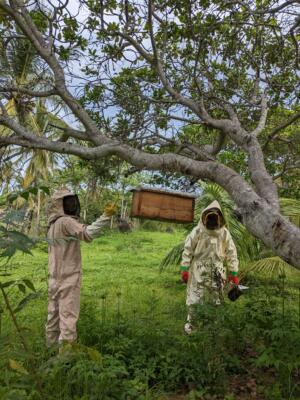Beekeeping Year Two Final Report
The second year of our beekeeping project with Save Lamu has ended. The aim of this 3-year project is to build a sustainable, locally governed community of beekeeping businesses in Lamu Archipelago and restore degraded mangrove ecosystems in Lamu Archipelago, actively with reforestation and passively through the increase of bee pollination.
This year they welcomed 5 new groups, 25 new colonies and 9 brand new apiaries across Pate Island.
In year 1 the group learnt that beekeeping in the Lamu Archipelago differs from other parts of Kenya. The bees’ honey production is lower, and their absconding instinct is higher as there is no large-scale flower-rich agricultural cultivation in the Archipelago to which beekeeping can be attached easily. They took this learning into Year 2 to give participants the best opportunity to generate as much honey as possible.

Overview of Activities
In Year 2 the beekeepers had eight harvests during the project. Many of these were small but offered great opportunities to the beekeepers to gain experience and confidence in handling the bees and products.
In Year 1, the group learnt that the bees in Lamu are very defensive which was a large challenge for people to overcome. However, through ongoing support and training these fears have been calmed and each apiary has members brave enough to open the hives and feed the bees. Furthermore, the group have We also have trained some beekeepers who can rescue bee colonies and catch bee swarms from unwanted locations such as schools or in gardens – these beekeepers have been put to the test many times this year!
However, there were still many challenges faced. Al Manar apiary in Kisisi (between Matondoni and Kipungani villages) was repeatedly vandalised and honey stolen which caused colonies to abscond. The project also encountered problems with their own beneficiaries which led to the termination of the Tarazak apiary in Matondoni due to the group’s lack of interest in working with bees. Environmental conditions of some apiaries also posed a large problem as their locations weren’t close to enough flowers and forage for bees, so they kept absconding. In response, the apiaries in Matondoni and Kipungani were relocated and joined together, where bees have shown better productivity.
A key achievement was the celebrations of World Bee Day in Mkunguni in Lamu Town on 20th May 2024. The group used this as an opportunity to raise public awareness about the importance of bees and how it benefits everyone. As the project has gone on it has become clear to the project leads that a lack of awareness of bees and beekeeping are posing huge challenges to the success of the project and the bees themselves. Therefore, the more opportunities the project has to engage with communities can hopefully reduce the incidence of theft, vandalism, and hive destruction.


At the end of the project cycle the group successfully created the Lamu Tamu Beekeepers Cooperative (LTBK) this is the county’s first community-led beekeeping organization and will support the new community of beekeepers in the following ways;
- Institutionalising the technical experience accumulated in this project so far
- Continued research to increase honey productivity.
- Saving bees and reducing human harm to bee colonies.
- Increasing access to markets and achieving a fair price for honey
As such, this organisation has the potential to become a powerful vehicle for implementing more impactful beekeeping programmes in Lamu County and beyond.
Conclusion
This project still has a one more year to go. In this year, we hope to see the LTBK grow and empower their members while raising the awareness of the importance of bees in the environment. It is hoped that the knowledge learnt so far can be shared and replicated to other areas, support new members joining the cooperative, and can be expanded across the entire county.
